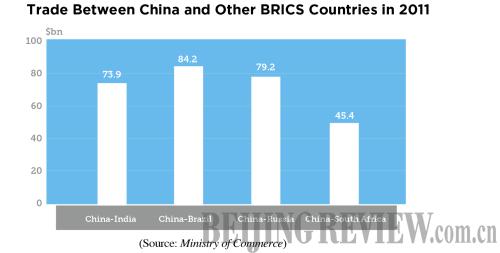|

At the New Delhi summit, leaders of the BRICS countries also stated their common stances on global issues, including climate change, global security and stability, sustainable development and hotspots such as the Iranian nuclear issue and current situation in Syria. Experts said BRICS can create a beneficial external environment for their development by promoting communication and coordination on these issues.
"We recognize the vital importance that stability, peace and security of the Middle East and North Africa hold for all of us," the leaders said in the Delhi Declaration. The five countries confirmed their commitment to achieving a "comprehensive, just and lasting settlement" of the Arab-Israeli conflict on the basis of the universally recognized international legal framework, including UN resolutions and the Arab Peace Initiative.
Meanwhile, the leaders urged an immediate end to all violence and violations of human rights in Syria, saying global interests would best be served through peaceful means, including broad national dialogue that reflects the legitimate aspirations of all sections of Syrian society and respect for Syrian independence, territorial integrity and sovereignty.
"We recognize Iran's right to peaceful uses of nuclear energy consistent with its international obligations, and support resolution of the issues involved through political and diplomatic means and dialogue between the parties concerned," they said. The BRICS nations also said they are fully committed to playing their part in addressing climate change and will contribute to global efforts through sustainable and inclusive growth and not by capping development.
The five BRICS nations all face the same problem of economic transition. "If they continue to follow the development path featuring high energy consumption and heavy pollution, the world will never satisfy their development demands because of the shortage of resources," said Liu Guijin, a former Chinese Ambassador to South Africa. In the field of sustainable development, developed and developing countries share common interests. They should work together to find a solution, he said.
The BRICS countries should make more efforts on sustainable development, realize balanced economic, social and ecological development, so as to protect developing countries' development rights and benefits, while contributing to the world's common development, he added.
According to the Delhi Declaration, the concept of a "green economy," which should be understood in the framework of sustainable development and poverty eradication, is a means to achieving these fundamental and overriding priorities, not an end in itself.
Liu Guijin stressed that ensuring the sustainable growth of their own economies will be the BRICS countries' biggest contribution to world economic recovery. "Without the BRICS economies' high-speed growth, the future of world economic development would be more depressing," he said.
The BRICS countries' cooperation is therefore beneficial to all developing countries and the world at large. As Chinese President Hu Jintao said at the summit, "The BRICS countries are an integral part of the big family of emerging markets and developing countries, and we are forces for world peace and common development."
Email us at: dingying@bjreview.com | 